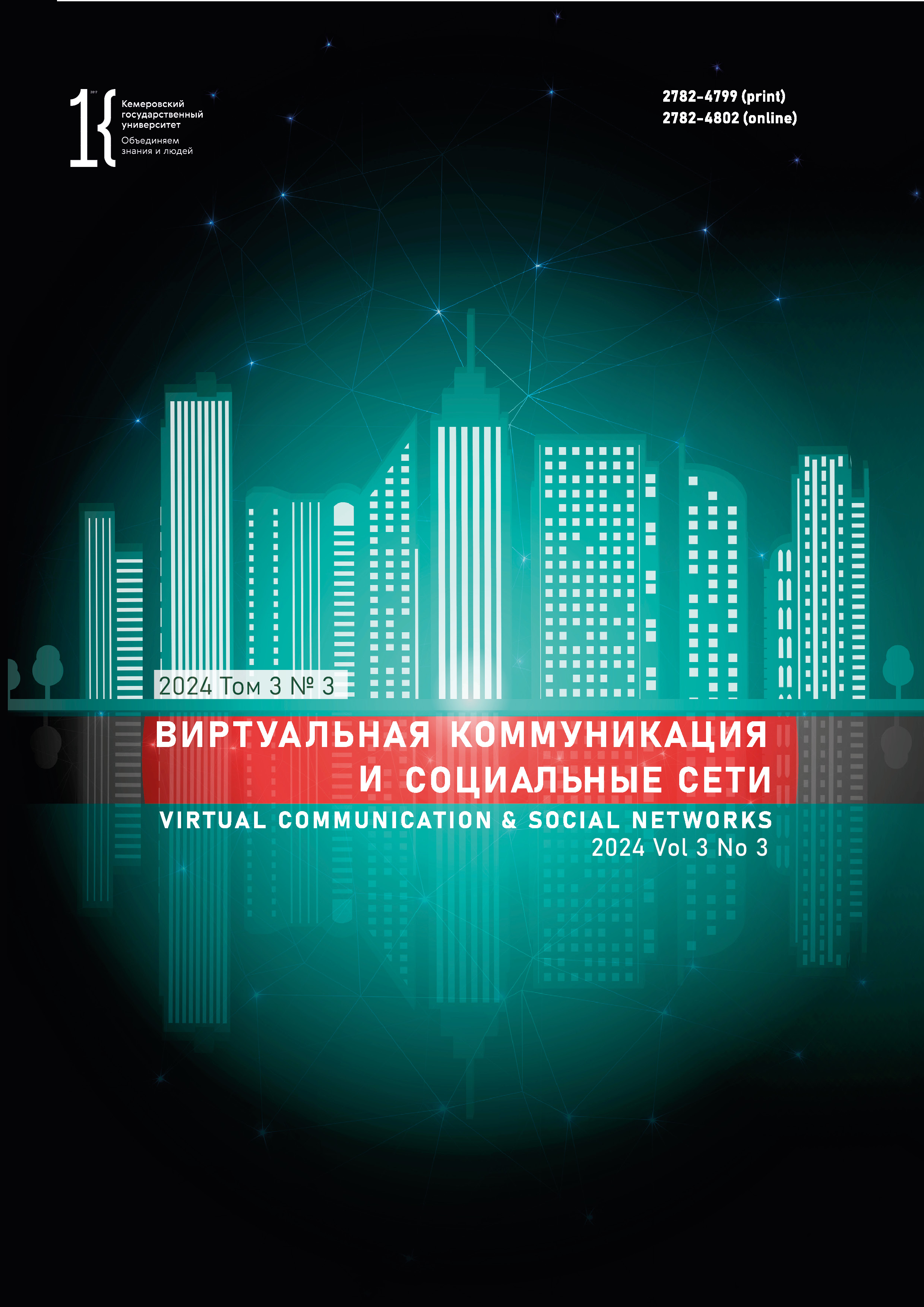Perm, Russian Federation
Perm, Russian Federation
The article considers the concept of digital reputation in relation to the executive authorities of the Russian Federation, as well as identifies the technological and communicative methods of its formation and maintenance. The digital reputation of a public administration body is a multicriterial assessment of its activities. It appears in media space and reflects the opinions of socially active population. Digital reputation is not identical to digital image. The authors revealed the following discursive factors that shape stereotypes about public administration. For instance, an indefinitely wide range of addressees lack basic knowledge in public administration; public assessments are flexible and unpredictable; some Internet users practice provocative speech behavior, etc. The research featured internet posts made by the Ministry of Science and Higher Education of the Russian Federation in the social network VKontakte. The service Popsters.ru made it possible to rate them by user involvement. A discursive and stylistic analysis of the posts with a high engagement coefficient revealed the following effective tools for managing the digital reputation of the authorities: hashtags as means of data distribution and systematization, dialogical and personalized presentation, interactive forms of communication (voting, polls, etc.), timely reaction to user comments, etc.
digitalization, mediatization, digital reputation, executive authorities of Russia, managing digital reputation, verbal techniques
1. Aiusheeva I. Z., Soyfer T. V. On the legal essence of digital reputation in sharing economy. Courier of Kutafin Moscow State Law University (MSAL), 2021, (11): 115–125. (In Russ.) https://doi.org/10.17803/2311-5998.2021.87.11.115-125
2. Bazhenova E. A., Shirinkina M. A. Discursive factors of media communication authorities and society. Aktualnye problemy stilistiki, 2023, (9): 51–60. (In Russ.)
3. Borovikova T. V., Rozanova N. N. Digital competence of civil servants as a risk factor for the reputation of government under conditions of digital transformation (at the regional level). Ekonomika i upravlenie: Problemy, resheniia, 2021, 2(8): 13–20. (In Russ.) https://doi.org/10.36871/ek.up.p.r.2021.08.02.002
4. Botnar D. S., Sizganova E. Y. Formation of positive digital reputation of state and municipal authorities. Vestnik Cheboksarskogo filiala Rossiiskoi akademii narodnogo khoziaistva i gosudarstvennoi sluzhby pri Prezidente Rossiiskoi Federatsii, 2020, (4): 92–99. (In Russ.) https://elibrary.ru/leyuea
5. Vokhidova A. Sh., Savoskin A. V. Digital transformation of public administration. Problems of interaction between public and private law in the regulation of economic relations: Proc. VI Intern. Sci.-Prac. Conf., Yekaterinburg, 16 May 2023. Yekaterinburg: USUE, 2023, 36–40. (In Russ.)
6. Golub O. Y., Sergeeva E. V. Crisis communication of power and society in social media: Identification of problem zones. Izvestiya of Saratov university. Sociology. Politology, 2020, 20(3): 257–263. (In Russ.) https://elibrary.ru/yadhal
7. Efremov V. A. Digital reputation: A guide for those who are online. MAGISTER, 2022, (1): 46–54. (In Russ.) https://elibrary.ru/nuiewy
8. Ilyicheva M. V. Communication processes in the interaction of the state and civil society institutions: Trends of changes in the digital environment. Vlast, 2021, 29(2): 39–46. (In Russ.) https://doi.org/10.31171/vlast.v29i2.7993
9. Kamshilova O. N., Chernyavskaya V. E. Academic reputation: A corpus-based analysis of the concept in Russian social practice in 2000–2011. Vestnik Tomskogo Gosudarstvennogo Universiteta. Filologiya, 2021, (70): 50–68. (In Russ.) https://doi.org/10.17223/19986645/70/4
10. Kurbangalieva D. L. The impact of digital reputation on corporate capitalization: From theory to practice (on the example of the automotive industry). Vestnik Rossiiskogo fonda fundamentalnykh issledovanii. Gumanitarnye i obshchestvennye nauki, 2022, (3): 46–56. (In Russ.) https://elibrary.ru/gvsgrp
11. Kurbangalieva D. L. Assessment of the impact of reputation in social networks on the economic activity of the company. Elektronnyi ekonomicheskii vestnik Tatarstana, 2018, (2): 72–76. (In Russ.) https://elibrary.ru/yxczvb
12. Lepina T. G. Digital reputation of civil servants and its legal protection. National priorities of Russia’s socio-economic development: Proc. VII All-Russian (National) Sci.-Prac. Corresp. Conf., Kursk, 23 Jun 2023. Kursk: MEBIK, 2023, 20–24. (In Russ.) https://elibrary.ru/kbxelc
13. Mityaeva O. A. Marketing approach to managing the digital reputation of an educational organization. Economic Systems, 2022, 15(4): 53–63. (In Russ.) https://doi.org/10.29030/2309-2076-2022-15-4-53-63
14. Mikhailova O. A., Shashmurina E. L. Image vs. reputation: The axiological potential of borrowed words. Axiological aspects of modern philological research: Proc. Intern. Sci. Conf., Yekaterinburg, 15–17 Oct 2019. Yekaterinburg: Azhur, 2019, 92–94. (In Russ.) https://elibrary.ru/nvxbrh
15. Rodina L. V. State authorities and state civil servants (employees) as carriers of professional reputation. Law, state, and society: Current issues, achievements, and innovations: Proc. Intern. Sci.-Prac. Conf., Penza, 30 Apr 2022. Penza: Nauka i Prosveshchenie, 2022, 11–13. (In Russ.) https://elibrary.ru/gxjbgd
16. Simonova M. K., Agibalova O. Yu. On the relevance of improving the management of the image and digital reputation of the executive bodies of state power of the subject of the Russian Federation (on the example of the department of social protection of the Voronezh Region). State and society in modern politics: Proc. 10 Intern. Sci.-Prac. Conf., Voronezh, 2 Dec 2022. Voronezh: Nauch. kn., 2023, 259–263. (In Russ.) https://elibrary.ru/wxebxf
17. Sirotin V. A. Strategy for managing the digital reputation of Volgograd business organizations: A sociological aspect. Sotsialno-gumanitarnye znaniia, 2023, (6): 37–41. (In Russ.) https://elibrary.ru/alnoxy
18. Shestakova E. V. Use of new digital technologies for reputation management in the system of state authorities on the example of the Perm Krai. Goroda i mestnye soobshchestva, 2022, 1: 295–304. (In Russ.) https://elibrary.ru/siomqi
19. Bharathi B. Crafting digital self: Navigating online identity and self-presentation. Delhi: BlueRose, 2011, 110.
20. Gasana K. Crisis communication and reputation management in the age of fake news. Journal of Public Relations, 2024, 3(1): 28–39.
21. Laskin A. V. Organizational reputation management: A strategic public relations perspective. Hoboken: Wiley-Blackwell, 2024, 208.


















